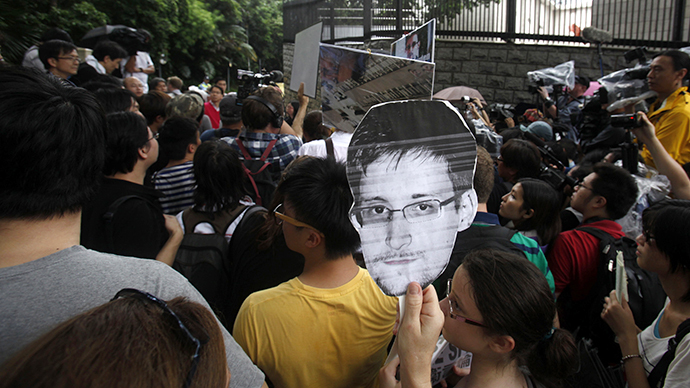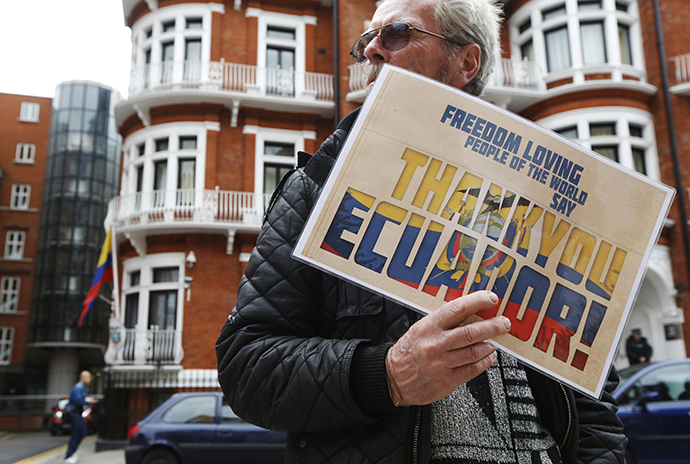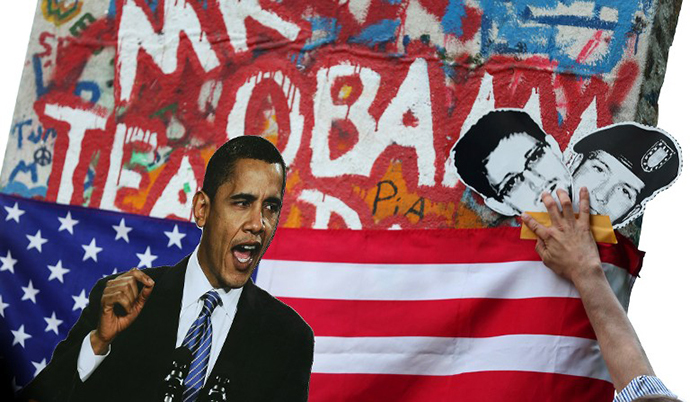‘There’s element of panic in US policy towards Edward Snowden’

As various countries say they cannot consider Edward Snowden’s request for asylum, US civil rights activist Norman Solomon tells RT that hardly any government will want to challenge the US in this way.
Solomon believes US attempts at grabbing Snowden and bringing him
to the US are a sign of panic. No one, including Snowden,
is capable of stopping further leaks, as the documents have been
handed to journalists or other people who can make them public.
Norman Solomon is one of the organizers of the "Hands Off Edward
Snowden!" online campaign, which calls on US citizens to
individually email President Obama asking him not to interfere in
Snowden’s attempts to seek asylum. 46,000 signatories have
already sent emails.
RT: In the letter to the Ecuadorian government,
Snowden stressed that he remain free to publish more leaks. Why
has he made such a statement, just after Russian President
Vladimir Putin said he can stay in Russia under condition he
stops his whistleblowing activity? Does it imply his refusal to
take Putin's proposal?
Norman Solomon: Not particularly. Because the horses are
already out of the barn. Ever since he surfaced in Hong
Kong a few weeks ago Edward Snowden has been very clear that
there are many documents showing the extent and techniques and
reach of US surveillance, that have already been provided to
journalists and, perhaps, other persons who can make them
available to the world which is an availability that should be
made. I think that that was determined well before Edward Snowden
reached the airport in Moscow.
RT:By releasing this letter now, is he trying to
affect the Ecuadorian government's decision on granting him
political asylum?
NS: Well, it’s a little unclear, certainly, it’s a
very warm letter on the whole towards the government of Ecuador,
and recognizing that apparently, as we have been informed, there
were travel documents made available to Mr. Snowden and made it
feasible for him to travel from Hong Kong, get on an airplane and
arrive in Moscow. That said it’s unclear whether there’s a single
government on the planet right now willing to challenge the
United States efficiently to offer asylum to Edward Snowden. That
is a sad commentary on the global power of the United
States.

RT:Snowden's threats of more leaks under his current
situation, meaning that he's a stateless person unable to seek
refuge anywhere, doesn't look like a desperate act, does it?
NS: I would say that Edward Snowden is not threatening to
release anything. He has already made clear in the last several
weeks, beginning with his surfacing and initial interview with
The Guardian newspaper by video that those documents that he has
from the USA are in the process of being released. We can clearly
infer that they have been provided in large quantities to The
Guardian newspaper, and perhaps other outlets included, like Der
Spiegel in Germany. So I don’t think that he’s doing anything
else other than fulfilling what he said several weeks ago, what
he had already begun to do, which is to share this documentation
with the world.
RT:In the statement Snowden accuses the U.S. of trying
to deprive him of his basic rights, including that of seeking
asylum. Do you think his accusations are justified? And if
America realizes that the information is going to come out
anyway, why is it in such a panic to get hold of Snowden?
NS: Yes, the information that hasn’t gone now is already
evidently in the pipeline. I think, what Snowden has said, is
quite justified – the US is trying to use its economic and
political and surveillance reach to grab him, to bring him back
in the US. There is an element of panic in US policy towards
Edward Snowden and this entire issue, and the effort is of the
big global giant trying to crush any ongoing voice in this case
from Edward Snowden who could authoritatively, with great
information, continue to inform the world. So I think that from
the standpoint of democracy, the US government is continuing to
try to persecute Mr Snowden by first acting as though there were
judge and jury and then pretending to want to go through a legal
process. The suppression of Bradley Manning, his nine months in
solitary in near and perhaps over the line of torture conditions
are a warning and that goes to the last part of your question.
The US government wants to discourage whistleblowing from those
in agencies like the NSA. The US is far, of course, from the only
government that engages in surveillance of its citizens which is
improper, including the Chinese and Russian governments. However,
the US government is the superpower when it comes to not only
military, but also surveillance capability and its actual
implementation. And, as an American I find that shameful. That is
why at RootsAction.org we have already 46,000 people who have
gone to our site in the last few days, sending individual emails
to president Obama saying “Hands off Edward Snowden!”

The statements, views and opinions expressed in this column are solely those of the author and do not necessarily represent those of RT.












